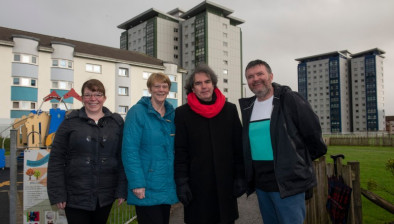Housing co-operative proposed for Glasgow students
 Students in Glasgow are being sought to help establish a housing co-operative which provides good quality housing to students at fair rents.
Students in Glasgow are being sought to help establish a housing co-operative which provides good quality housing to students at fair rents.
A group of about twelve students from the University of Glasgow and Glasgow School of Art are hoping to recruit students from other institutions in the city to become involved in running Glasgow Student Housing Co-op (GSHC).
Initially inspired by a visit to Edinburgh Student Housing Co-op, who are currently the only student housing co-op in Scotland, the group held its first meeting in November 2016 and since then have visited another student housing co-op in Birmingham, attended conferences and held a fundraising event.
So far the students have received support from Glasgow City Council’s co-operative development unit and successfully applied for funding to the Co-operative Glasgow Business Development Fund. This grant enabled the group to have training delivered by Coops UK in Governance and Financial Management.
With its registered office at Orkney Street Enterprise Centre, the GSHC is also receiving business advice from Jobs and Business Glasgow and recently became incorporated as a Co-operative Society under the Co-operative and Community Benefit Societies Act 2014.
Kirstie McLean from the Glasgow Student Housing Co-operative told Scottish Housing News: “We would like to start a student housing co-op to address problems often faced by students in the private rented sector (PRS). It can be difficult for students to find suitable housing, rents in the PRS can be high and some students experience problems getting repairs done which is frustrating. Students often have little control over their living situations and lack knowledge of housing law and private rented sector making it difficult to get problems resolved.
“A co-op provides democratic control - students have a say in how their housing is run and are empowered to make decisions affecting their lives. It is also an opportunity to learn new skills.”

Housing co-operatives are autonomous, sustainable, and democratically managed by the tenants, and can be desirable for people who want below market rents, a source of community, and the responsibility and freedom of running their own accommodation.
The focus on inclusiveness and community can also help to break down barriers that can sometimes exist between students and the existing community.
Glasgow Student Housing Co-op carried out a survey of 155 current students of the University of Glasgow and found that 71% said they were interested in living in a co-op and 27% said they may be interested.
Kirstie added: “The GSHC group wants to establish and run a housing co-op adhering to co-operative principles and providing good quality housing to students at fair rents. We believe this would be valuable in terms of empowering students to collectively manage and determine our own accommodation situation, with an operational focus on autonomy and community.
“We working to set up the co-op as an alternative to existing specified student accommodation and the PRS, which is relatively expensive and has limited stock suitable for students. We are motivated by the possibility of establishing a housing co-op that promotes sustainability and empowerment in student engagement with housing, and develops members’ capabilities regarding planning, managing projects, and running an organisation.”

The model of student housing co-operatives has proven successful, particularly in the US where many such co-ops exist and in recent years the Edinburgh Student Housing Co-operative, the Sheffield Student Housing Co-operative, and the Birmingham Student Housing Co-operative have proven the viability of student-managed housing in the UK. Progress is underway for establishing student housing co-ops in Nottingham, Newcastle, Leeds as well as Glasgow.
Kirstie explained that the students intend to run the co-operative in adherence to the seven Rochdale Co-operative Principles of:
She added: “A community based co-op allows students to take control of their living situation, democratically make decisions about how their accommodation is run, and develop skills and build sustainable communities. This model could benefit all tenants but we would argue that it is particularly relevant to students, who may be moving away from home for the first time or who have just arrived in Glasgow and may not be fully aware of their rights as a tenant.
“Avoiding exploitation by landlords, cheaper rents, better condition of properties, mutual support and autonomy of decision making are advantages of this type of tenure making it a much needed addition to the student housing market in Glasgow.
“We are at the point now where we are starting to look for a building. We are considering all options for this including a commercial type lease or purchasing a building using a mortgage. Other student housing co-ops (three existing in Edinburgh, Birmingham and Sheffield) all leasing buildings so we would like to investigate possibilities for renting a suitable building further.”
The newly formed Glasgow Student Housing Co-op is hosting a networking event on May 13, more information for which can be found here.









